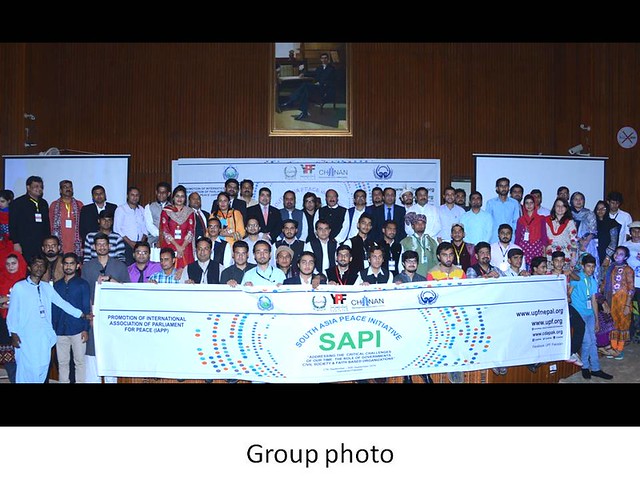Islamabad, Pakistan—The 19th South Asia Peace Initiative (SAPI) conference was held at the National Library of Pakistan in Islamabad on September 29, 2016. The event, whose theme was “Addressing the Critical Challenges of Our Time: The Role of Governments, Civil Society & Faith-Based Organizations,” was attended by 410 people and five current members of Parliament, and was organized by UPF in partnership with the Young Parliamentarians Forum Pakistan and the Chanan Development Association, a national youth-led organization. The co-sponsors were UPF and the International Association of Parliamentarians for Peace (IAPP).
The SAPI brings together people from all social disciplines to build common ground based on universally shared values, rooted in the family. The focus is to foster sustainable development, mutual prosperity and regional amity in South Asia. Since 2005, nineteen programs have been held throughout the region, including in: Nepal, India, Afghanistan, Sri Lanka and, most recently, in Pakistan.
After welcoming the guests, Mr. Binod Dangi, secretary general of UPF-Nepal, said SAPI addresses one of the most critical issues in not only South Asia but also the world. The deliberations among experts and leaders from diverse political, religious and social backgrounds that take place during SAPI meetings and conferences provide new insight into how significant threats to peace and democracy in our world can be addressed.
Chair of UPF-Nepal and Convener of SAPI Hon. Ek Nath Dhakal, former minister of peace and reconstruction of Nepal, was the keynote speaker. He said South Asian countries should move forward centering on the agendas of peace and development. Mr. Dhakal added that without peace and security, nations in the region will not prosper. Mr. Dhakal presented the background and history of SAPI from 2005 to today, and said that Nepal is deeply concerned about the spread and condemns all forms and manifestations of extremism and religious fundamentalism. “We must act today as a positive and peaceful agent of change of our society. We need to act urgently to help nations and this world avoid further division and misfortune,” he said. In addition, Mr. Dhakal introduced the vision and mission of the IAPP.


